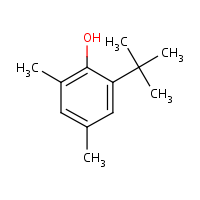6-tert-Butyl-2,4-xylenol
Agent Name
6-tert-Butyl-2,4-xylenol
CAS Number
1879-09-0
Formula
C12-H18-O
Major Category
Other Classes

Synonyms
2,4-Dimethyl-6-tert-butylphenol; 2-tert-Butyl-4,6-dimethylphenol; 6-t-Butyl-2,4-dimethylphenol; 6-t-Butyl-2,4-xylenol; 6-tert-Butyl-2,4-dimethylphenol; Phenol, 2-(1,1-dimethylethyl)-4,6-dimethyl-; Prodox 340; Topanol A; 2,4-Xylenol, 6-tert-butyl-; [ChemIDplus] Antioxidant 30; 2,4-Dimethyl-6-tert-butylphenol; 6-(1,1-Dimethylethyl)-2,4-dimethylphenol; M 24; M 24 (antioxidant); 2-Methyl-6-tert-butyl-p-cresol; [CAMEO] 2,4-Xylenol, 6-t-butyl-; [OECD SIDS: 6-tert-Butyl-2,4-xylenol - 1996] UN2922
Category
Phenols
Description
Melting point = 22.3 deg C; [ChemIDplus] Yellow liquid with a phenolic odor; [CAMEO] Liquid; mp = 22-23 deg C; [Sigma-Aldrich MSDS]
Sources/Uses
Used as an antioxidant and rubber processing agent; [OECD SIDS: 6-tert-Butyl-2,4-xylenol - 1996] Used as an intermediate and in the formulation of lubricant additives, lubricants, greases, hydraulic fluids, and metalworking fluids; [ECHA REACH Registrations]
Comments
A repeated-dose/reproductive/developmental oral study of rats produced increased liver and kidney weights in parental animals (corresponding histopathological changes), loss of litters during lactation, a NOEL of 6 mg/kg/day for repeated-dose toxicity, and a NOEL of 30 mg/kg/day for reproductive toxicity; [OECD SIDS: 6-tert-Butyl-2,4-xylenol - 1996] Causes convulsions, acute pulmonary edema, and other changes in lungs, thorax, or respiration in dermal and oral lethal-dose studies of guinea pigs; [RTECS] May cause severe burns; [CAMEO] A skin and strong eye irritant; Harmful by ingestion (targets liver and kidneys); Highly toxic by skin absorption; [ECHA REACH Registrations] Causes burns; Inhalation may cause corrosive injuries to upper respiratory tract and lungs; Harmful by ingestion; Highly toxic by inhalation; Toxic by and skin absorption; [Sigma-Aldrich MSDS] See "Xylenol."
Biomedical References
Exposure Assessment
Vapor Pressure
0.013 mm Hg
Explanatory Notes
The Guide in the Emergency Response Guidebook is for "Corrosive liquid, toxic, n.o.s."
Adverse Effects
Toxic Pneumonitis
Yes
Hepatotoxin
Hepatoxic (a) from occupational exposure (secondary effect) or (b) in animal studies or in humans after ingestion
Dermatotoxin
Skin burns
Diseases, Processes, and Activities Linked to This Agent
Processes
Industrial Processes with risk of exposure: